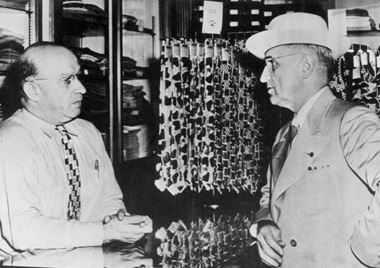The Man Who Made Israel Possible

Eddie Jacobson with Harry Truman
Edward Jacobson (1891-1955) was born in New York City to Jewish-Lithuanian immigrants. The family was extremely poor, and soon set out for new opportunities in the Midwest. As a teenager, Jacobson worked in a Kansas City factory and became good friends with one Harry Truman. The two eventually parted ways, with Truman enlisting in the National Guard and Jacobson working as a salesman. Years later, at the outbreak of World War I, Jacobson enlisted in the army and happened to be placed in the 129th Field Artillery – where Truman was first lieutenant. Over the course of the war, Truman and Jacobson ran a unit canteen (where soldiers can buy goods), starting it off by collecting $2 from their fellow soldiers to get their initial stock. While most canteens inevitably lose money, Truman’s and Jacobson’s canteen actually turned a huge profit. They were able to return the $2 to all the soldiers, and eventually raised $10,000 in profits. After the war, they used some of this money to try their hand at a number of business (including the Truman & Jacobson Haberdashery), all of which ultimately failed. Truman would go into politics, while Jacobson remained a travelling salesman. Whenever he happened to be in Washington, Jacobson would make sure to visit his old friend. In 1945, Jacobson founded Westport Menswear in Kansas City and finally found success in business. Meanwhile, in 1944, President Roosevelt was running to be re-elected for an unprecedented fourth term. He realized that to win he would have to replace his increasingly unpopular vice president, and the party eventually settled on the likeable and devout Truman. The duo won the election, and were sworn in on January 20, 1945. However, Roosevelt was in failing health, and would often get severe headaches or suddenly fall unconscious. Just 82 days later, he died of a cerebral hemorrhage, leaving Truman with the presidency. Throughout this time, Jacobson and Truman retained their strong friendship, and some report that Jacobson had open access to the Oval Office. In early 1948, the Zionists were campaigning for support of their hopeful state. While Truman sympathized with the Jews, the US State Department was vehemently opposed to the creation of a Jewish state. So many Jews were petitioning Truman that he refused to hear any more of it. When Chaim Weizmann made a last-ditch effort trip to the US, Truman wouldn’t meet him. It was then that Jacobson, though reluctant and afraid to damage his lifelong friendship with Truman, approached him and said: “Your hero is Andrew Jackson. I have a hero too. He’s the greatest Jew alive. I’m talking about Chaim Weizmann. He’s an old man and very sick, and he has traveled thousands of miles to see you.” Truman relented, and Weizmann managed to convince him to support a Jewish state. While the State Department warned Truman that he would risk losing the support of Arabs, and more importantly, their oil supply, Truman replied that he would decide “on the basis of justice, not oil.” Less than two months later, Ben-Gurion declared independence, and Truman was the first to recognize the State of Israel just 11 minutes later. When Truman left the presidency, he intended to take a trip to the Holy Land, and Jacobson was planning to be his guide. Unfortunately, Jacobson died of a sudden heart attack before it could happen. The Truman Library maintains a huge collection of documents and correspondence between Jacobson and Truman (available here), and there is now a play, called ‘Eddie’, based on their warm relationship.
The Spiritual Significance of Israel Turning 70
15 Reasons to be Proud of Israel
Words of the Week
Hitler had been murdering Jews right and left. I saw it, and I dream about it even to this day. The Jews needed some place where they could go. It is my attitude that the American government couldn’t stand idly by while the victims of Hitler’s madness are not allowed to build new lives.
– President Harry S. Truman
